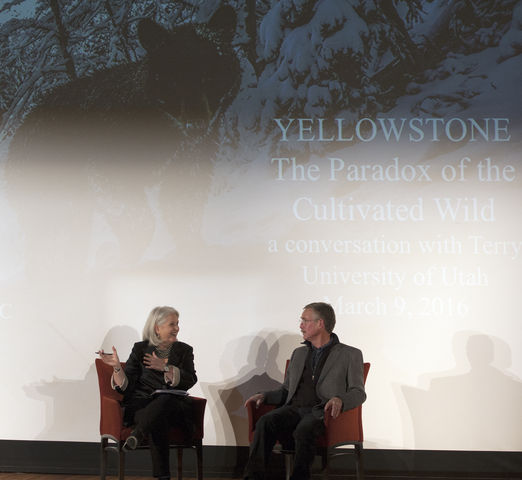As the National Park Service approaches its 100-year anniversary this summer, the costs and benefits of these parks are being questioned.
To discuss the topic, the environmental humanities graduate program brought in writer and journalist David Quammen on March 9 to meet with about 200 students, faculty and community members. Quammen is the author of the upcoming May 2016 National Geographic focused on the greater Yellowstone ecosystem.
Quammen spoke about how the area — the first national park — is a “paradox of the cultivated wild.”
“We are still managing this landscape in order to make it seem unmanaged,” he said.
After two years spent researching, Quammen’s piece delves into issues such as regulating bison population sizes, excluding Native Americans from living in the park and how expanding developments around the park are protruding deeper into natural habitats. A large part of his work highlights how grizzly bears had to adjust to changes in their environment and coexist with humans in this space.
Among scientists and conservationists, there is a continuing discussion on how to balance the natural world and humans’ fascination with it. Rachel Heath, currently enrolled in the U’s environmental humanities program with a degree in recreation resource management from Oregon State University, said she came to learn about Yellowstone’s example of land and wildlife management.
“I think it’s really important that we start to understand as a society what that paradox entails,” she said. “Managing them does inherently change them. So, what does wild really mean?”
Quammen mentioned this debate briefly in the question-and-answer section that followed the discussion with Terry Tempest Williams, author and associate instructor for the environmental humanities program. Questions from the audience brought up a disagreement between Tempest Williams and Quammen on wildlife management. Audience members were also asked their views.
Jeff McCarthy, director of the program, said the conversation-style event was meant to open further discussion on how to view public land.
“National parks are a great place to start because they are such a beloved element of people’s vacations and of their dreams and of their bucket lists. At the same time, national parks are just one of many types of public lands,” McCarthy said.
Quammen concluded by telling the audience there is plenty of work to do if they want Yellowstone to be around for generations to come.
“There are a lot of very difficult political and cultural, unselfish decisions that have to be made,” Quammen said. It will take adjustments and adaptations, but, “If we expect a grizzly bear to adapt, we ought to be able to adapt too.”
@carolyn_webber






















